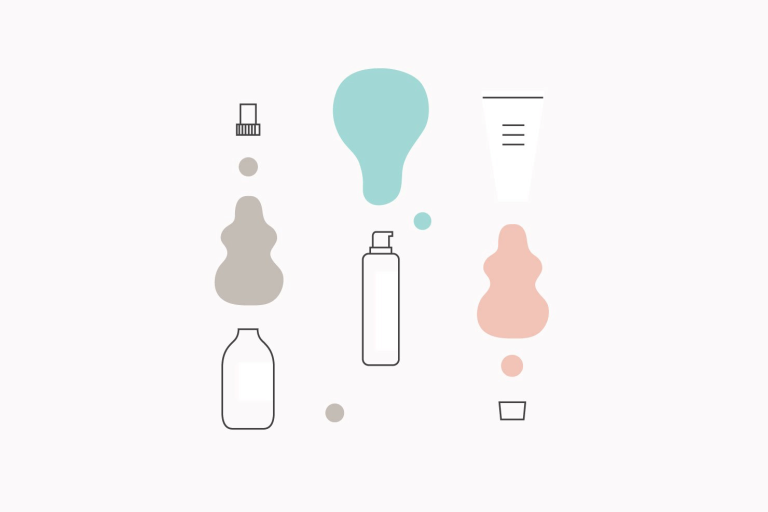How it works:
Share your skin goals and snap selfies
Your dermatology provider prescribes your formula
Apply nightly for happy, healthy skin
How it works:
How it works:
Share your skin goals and snap selfies
Your dermatology provider prescribes your formula
Apply nightly for happy, healthy skin
How it works:
Acne-friendly makeup
What makeup ingredients cause acne, and how to find a makeup routine that promotes clear healthy skin.



If you have acne, makeup can be your best friend and worst enemy. The right makeup hides your pimples and gives you confidence. But the wrong makeup can irritate your skin and may make underlying acne worse. Some people find themselves trapped in cycles — acne, makeup, more acne, more makeup! Before you give in to despair, read this guide to learn what makeup ingredients cause acne, and how to find a makeup routine that promotes clear healthy skin.
Is my makeup causing breakouts?

Technically, most makeup doesn’t cause acne, but certain ingredients can clog pores, which helps acne-causing bacteria grow.
The good— look for makeup labeled:
Non-comedogenic: This scientific term translates to “not clogging your pores.” Unfortunately, there is no regulation around the use of this word, meaning any product could potentially claim to be non-comedogenic, so use with caution!
Non-greasy
Hypoallergenic
Non-irritation
Mineral-based: This type of makeup carries less risk of irritation and is less likely to clog pores. Look for zinc oxide on the label. This ingredient supplements your sunscreen but doesn’t replace it!
The bad — beware!
Some common ingredients in cosmetics and skincare products can clog pores or irritate sensitive skin (yes, even if the label says a product is “non-comedogenic” or “gentle”). Find out which ingredients can potentially clog pores.
Getting makeup on...

Moisturizer with SPF: If you have oily skin, you don't necessarily need this step. Don’t forget about sunscreen though!
Acne-Fighting Foundation: Most acne-fighting foundations contain salicylic acid, also known as beta hydroxy acid or BHA. This helps shed and peel the outermost layer of skin. It’s great for oily skin but you might want to avoid it if your skin is sensitive or dry.
Pro Tip: If you’re already using a dedicated acne treatment, you don’t need salicylic acid in your foundation. Too much can lead to irritation and redness.
Acne-friendly makeup: With so many products available, you may need to try out different makeup to find the products that work best with your skin type. When choosing makeup, remember that you want to look for products that say “non-comedogenic,” “oil-free” or “mineral based”, because these are less likely to cause breakouts. See above for more criteria!
...and getting makeup off

At the end of the day, your makeup should be gone like it was never there. To avoid irritation, choose the right makeup remover for your skin type.
Micellar water for makeup removal is generally a good option for all skin types. Micellar water is a non-rinse, soap-free cleansing water. It cleans pores by pulling out dirt and oil while keeping skin hydrated. It’s an ideal makeup remover for all skin types, including acne-prone skin.
If you have dry skin, you can try:
Micellar water
Oils
Cleansing creams and milks
The cleanser by Curology
If you have oily skin, you can try:
Micellar water
Oils
Foaming cleansers
The cleanser by Curology
The cleanser by Curology is a gentle, light-foaming everyday cleanser. It’s safe and non-irritating for all skin types and
The micellar makeup remover by Curology is the Swiss army knife of makeup removal. It cleanses, removes makeup, and moisturizes all in one step by using micelles (tiny particles) to pull the dirt and oil out of your skin.

For an extra fresh face, use the micellar makeup remover first, followed by the cleanser, also known as double cleansing.
Mineral oil and some other oils such as olive oil are cheaper alternatives for makeup removal and are generally well-tolerated. But that’s a whole other topic.
Face wipes may sound like the most convenient things in the world, but they often contain ingredients (hello, alcohol) that can irritate the skin. If that’s all you have on you, gently splash your face with water after using a face wipe.
Other makeup removal best practices

Use a makeup applicator. Applying your makeup with your fingers is simple and easy, but it can potentially transfer dirt and oil from your fingers to your face.
Clean your brushes and tools regularly.
Try makeup bottles with pumps — they more hygienic than screw tops!
Patch test new product samples from beauty stores, but remember that unless you test a product for weeks or sometimes months, you won’t know for sure how your skin reacts to it.
Always remove your makeup before exercising and going to bed.
Last but not least, put your skin on a diet
If you’ve removed obvious offenders from your makeup routine but you’re still breaking out, it might be time to try a skin diet. Remove one makeup product from your routine for a week or two, and see how your skin reacts. Listen to your skin. Respect it. There is no one-size-fits-all — do right by yourself.
Sometimes, despite a person’s best efforts, acne can be stubborn. If your acne is persistent and you have questions about how to treat it, or how to select skin care products for your skin type, it may be time to visit your local dermatology provider.

Skincare, demystified
Treating breakouts can create a lot of work to find the right products and routine. Curology takes the guesswork out of skincare by sending a complete, no-clog routine straight to your door, featuring a Custom Formula with a mix of ingredients chosen for your unique skin.
Get your personalized skincare routine with Curology
Get your personalized skincare routine with Curology


New Curology members can try the micellar makeup remover at no extra cost and you’ll get paired with our in-house dermatology providers—they’ll evaluate your skin and decide if our custom, prescription skincare is right for you. Start your free trial of Curology now.
We’re here to tell you what we know. That’s why our information is evidence-based and fact-checked by medical experts. Still, everyone’s skin is unique—the best way to get advice is to talk to your healthcare provider.

Curology Team

Nicole Hangsterfer, PA-C
Related Articles
Ask an expert: What are the best skincare ingredients?Pimple patches, explained: How they help (and where they fall short)Why prescription skincare changes the gameWhat are some of the best cleansers for normal skin?Face sunscreen for normal skinPopular Articles
Ask Curology: Is my cold breaking me out?Slugging: The dermatologist-approved skincare hack going viral on TikTokTretinoin vs retinol: What’s the difference?How to create a self-care routine that actually sticksYour 2023 skincare horoscopeTry prescription skincare
Get routine essentials


Get clearer skin with Custom FormulaRX
Get clearer skin with Custom FormulaRX
- Breakouts
- Clogged pores
- Whiteheads
- Redness
- Blackheads
$29.95/month